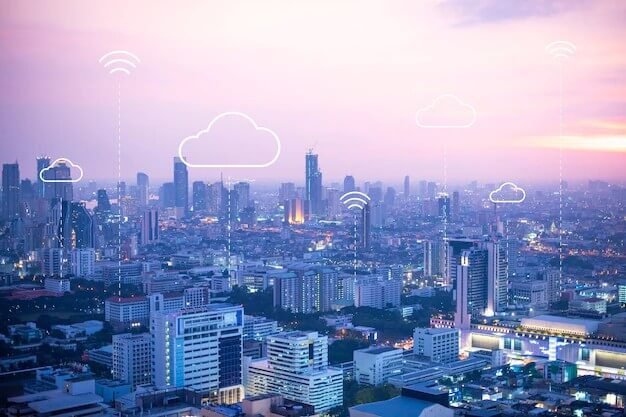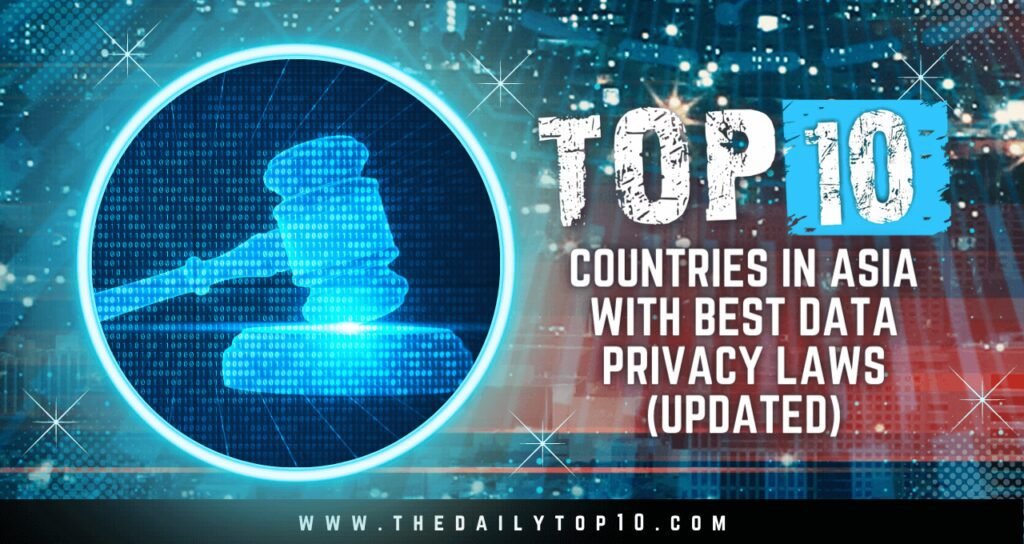Data privacy is a growing concern in today’s digital age, with more and more personal information being shared online. Consisting of many Technologically Advanced Countries, Asia has implemented strong data privacy laws in order to protect their citizens’ personal information. So, the World’s #1 Source of Research-Based Content, The Daily Top 10, is here to share with you the updated list of the Top 10 Countries in Asia With Best Data Privacy Laws.

Data Privacy Laws vary from country to country and can include data collection, storage, and use regulations, as well as penalties for non-compliance. It’s important to note that the laws and regulations around data privacy are constantly evolving, with new laws and amendments being introduced regularly.
As a result, it’s important to stay informed and stay up-to-date with the latest developments in Data Privacy Laws in order to ensure that your personal information is being protected to the fullest extent possible. So, let’s explore the Top 10 Countries in Asia With Best Data Privacy Laws.
Which Country in Asia Leads with the Best Data Privacy Laws?
We all know that technology has revolutionized the way we live and work, making our lives easier and more efficient. But it has also had its share of disasters. So, we have updated you with the Top 10 Biggest Technological Disasters of All Time to raise your awareness. However, Asia is home to some of the world’s most advanced economies, and many of these countries have implemented strong data privacy laws to protect citizens’ personal information.

In this article, we will take a look at the Top 10 Countries with Asia’s Best Data Privacy Laws. But before identifying the Best Country in Asia With Best Data Privacy Laws, let’s check out the rest of our list.
TOP 10: India

India is not only the Best Country in Asia to Celebrate New Years Eve but also with the best Data Privacy Laws. India’s Information Technology Rules, 2011, commonly referred to as “IT Rules,” regulates organizations’ personal data collection, use, and storage. It was introduced in 2011 and is considered one of the strong data privacy laws in the region.
According to CCA, the “IT Rules” require organizations to obtain explicit consent from individuals before collecting or using their personal data. It also requires organizations to implement appropriate security measures to protect personal data. Additionally, the said rules established the Office of the Controller of Certifying Authorities (CCA) to enforce compliance with the Rules and to handle complaints related to personal data protection. That also requires organizations to conduct regular data protection impact assessments for any data collection, usage, and storage activities that pose a higher risk to the data subject’s personal data.
TOP 9: Philippines

The Philippines has a robust data privacy framework in place, anchored on the Data Privacy Act of 2012. The law provides for the protection of personal information and sensitive personal information, as well as the rights of individuals regarding their personal information. It also establishes the National Privacy Commission, which is responsible for enforcing the law and ensuring compliance by organizations.
Additionally, Privacy stated that the Philippines has also ratified the Convention for the Protection of Individuals concerning Automatic Processing of Personal Data, a Council of Europe convention which is one of the first legally binding instruments on data protection. In addition to the data privacy laws, browse the Philippines Country Profile for the Top 10 Most Controversial Issues in the Philippines.
TOP 8: Indonesia

Indonesia’s Data Privacy Laws, known as the Personal Data Protection Law (PDPL), is strong and best, and important law for several reasons. Most importantly, it helps protect the personal information of individuals in Indonesia and ensure that their rights are respected. Data Protection stated that the law sets out specific requirements for the collection, use, and disclosure of personal data and requires organizations to obtain consent from individuals before collecting or using their personal data.
In addition, organizations are required to take measures to protect personal data from unauthorized access, use, or disclosure. It also helps to promote trust in the digital economy by ensuring that personal data is handled responsibly and transparently. The law helps to build confidence among individuals and businesses in using digital services. This can help to support the growth of e-commerce and other digital services in Indonesia. For more articles, check the Indonesia Country Profile for Top 10 Best and Most Inspiring People in Indonesia.
TOP 7: Thailand

Thailand is one of the Most Technologically Advanced Countries in Asia. Thailand’s Personal Data Protection Act (PDPA) is considered to have strong data privacy laws. It was introduced in 2019 and regulated the collection, use, and storage of personal data by organizations. The PDPA requires organizations to obtain explicit consent from individuals before collecting or using their personal data and also requires organizations to implement appropriate security measures to protect personal data.
According to Trade, Thailand’s first consolidated law to govern data protection was fully enforceable in June 2022. The PDPA, which was signed in 2019, was postponed from 2020 following Cabinet approval of a royal decree that proposed the enforcement beginning in 2022. The legislation mandates that data controllers and processors who use personal data must receive consent from data owners and use it only for expressed purposes.
TOP 6: Malaysia

Data Guidance stated that Data privacy laws in Malaysia are governed by the Personal Data Protection Act 2010 (PDPA). The PDPA sets out rules for the collection, use, and disclosure of personal data and gives individuals certain rights in relation to their personal data. The Act also established the Personal Data Protection Commission (PDPC) to oversee compliance with the Act and has the power to impose penalties on organizations that violate the Act.
The power of the PDPC to enforce the PDPA is relatively strong, and organizations that fail to comply with the Act may face significant fines and other penalties. Additionally, the PDPA establishes the Personal Data Protection Department (PDPD) to enforce compliance with the Act and to handle complaints related to personal data protection.
TOP 5: Hong Kong

Hong Kong has a strong legal framework for data privacy, which is governed by the Personal Data (Privacy) Ordinance (PDPO). We can see the PDPO sets out rules for the collection, use, and disclosure of personal data and gives individuals certain rights in relation to their personal data, as mentioned in Mondaq.
In addition, Hong Kong has adopted a “risk-based” approach to data privacy regulation, which allows organizations more flexibility in how they handle personal data as long as they can demonstrate that they have taken appropriate measures to protect the data. This approach is considered to be more business-friendly than a prescriptive approach. Accordingly, Hong Kong is a Special Administrative Region of China. He has a separate legal system from mainland China, which adds to its attractiveness as a global hub for data protection due to its privacy-friendly laws, strong regulatory framework, and independent judiciary.
TOP 4: Singapore

Singapore is the 7th Richest Country in the World. Singapore is also known for its strong enforcement of data privacy laws. The PDPC has the power to investigate complaints and impose significant fines on organizations that violate the PDPA and has demonstrated a willingness to take action against organizations that fail to comply with the Act. According to PDPC, the PDPA has two main components: the Do Not Call (DNC) provision and the data protection provision.
Singapore’s data privacy laws are closely aligned with international standards, such as the EU’s General Data Protection Regulation (GDPR) and the Asia-Pacific Economic Cooperation (APEC) Privacy Framework, which makes it an attractive destination for businesses operating in the region and globally. So, the country’s reputation for alignment with international standards further enhances its attractiveness as a destination for data protection.
TOP 3: Taiwan

ICLG stated that Data protection in Taiwan is led by the PDPA and the Enforcement Rules of the Personal Data Protection Act. NDC is the lead regulator when it comes to interpreting the PDPA, but the PDPA is enforced by the competent regulators that govern each industry. Among them, the Financial Supervisory Commission is the most active law.
To be highlighted, the NDC launched its Personal Data Protection Office in 2018. It brings Taiwan’s data protection laws in line with EU standards as part of Taiwan’s efforts to gain an adequacy law from the European Commission. Organizations that handle sensitive personal information, such as financial or health information, are subject to additional regulations and must obtain additional consent from individuals.
TOP 2: South Korea

According to iapp, South Korea has strict data privacy laws that are designed to protect individuals’ personal data. South Korea’s wide-ranging Personal Information Protection Act (PIPA) was passed on September 30, 2011, making the country one of the world’s strictest privacy regimes.
The Network Act sets out rules for the collection, use, and disclosure of personal data and gives individuals certain rights in relation to their personal data. The Act also established the Korea Communications Commission (KCC) and the Personal Information Protection Commission (PIPC) to oversee compliance with the Act. The PIPC has the power to investigate complaints and impose penalties on organizations that violate the Act, including fines and imprisonment.
TOP 1: Japan

Japan is one of the Most Technologically Advanced Countries in Asia. In addition, Japan is considered to have some of the best data privacy laws in Asia. End Point Protector mentioned that the legal framework for data privacy in Japan is governed by the Act on the Protection of Personal Information (APPI), which was enacted in 2005 and came into effect in 2017.
Japan’s data privacy laws have a strong emphasis on data security, with provisions for data encryption and other measures to protect personal data from unauthorized access, use, or disclosure. Furthermore, Japan has implemented several measures to strengthen data protection and privacy, and its data privacy laws are considered among the strongest in Asia. Accordingly, Japan is the Country With Best Data Privacy Laws.
Which Countries in Asia have the Best Data Privacy Laws?
Data privacy laws in Asia vary greatly among countries. Based on the criteria used for this analysis, Japan, Singapore, South Korea, Hong Kong, and Taiwan can be identified as having some of the strongest data privacy laws in the region. Additionally, other countries such as India, Thailand, Hong Kong, and the Philippines also have implemented their own regulations to protect data privacy. It is also important to note that the situation is constantly changing and is subject to ongoing updates and revisions.

Here is the list of the Top 10 Countries in Asia With the Best Data Privacy Laws:
- Japan
- Singapore
- South Korea
- Hong Kong
- Taiwan
- Malaysia
- Philippines
- Thailand
- India
- Indonesia
Most importantly, keep in mind that this list is subject to change as laws and regulations are constantly updated. It is also important to note that a country’s data privacy laws may not necessarily reflect the level of protection and enforcement in practice. So, this is The Daily Top 10, and we invite you to check out the Asia Category for the latest updates on Asian countries like the Top 10 Richest Countries in Asia by GDP Per Capita and the Top 10 Best and Biggest Car Insurance Companies in Asia.


Top 10 Best Coffee Shops in Asia (Updated)
Top 10 Richest Countries in Asia by GDP Per Capita (Updated)
Top 10 Best-Proven Tips to Secure Your Instagram Account
Top 10 Must-Visit Cultural Festivals in Asia (Updated)
Top 10 Best & Biggest Private Hospitals In Asia (Updated)
Top 10 Best Tech, Web3 and Blockchain News & Trends in 2022